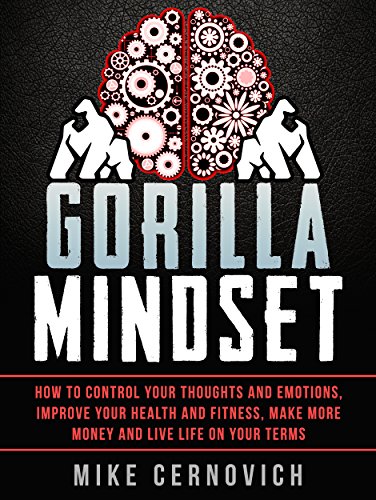For those of you who pay attention to the crazy media landscape that we find ourselves stuck with, you might recognize the author of one of the latest books that I read – Mike Cernovich. Mike has been at the forefront of calling out all types of untrue news on all sides of the political and social spectrum and he does a great job at it (check out his Twitter account if you want to see what I am referring to here).
 I first came across Mike’s writing years ago when he was focusing more on helping people break out of their bad habits and become better versions of themselves. That mindset is carried into this book and Mike does a great job of trying to make the strategies and tactics that he uses work for the reader. Here are some of the lines in the book that stood out to me, so I thought I would share them here.
I first came across Mike’s writing years ago when he was focusing more on helping people break out of their bad habits and become better versions of themselves. That mindset is carried into this book and Mike does a great job of trying to make the strategies and tactics that he uses work for the reader. Here are some of the lines in the book that stood out to me, so I thought I would share them here.
“To get more out of life, you must get more out of yourself. You must take personal responsibility for your thoughts and emotions. You must stop blaming the system. The days of looking outside of yourself for answers are gone!”
These are words that everyone should live by – stop looking to others to provide answers to your problems. Stop thinking that the system is out to get you – it is not out to get you or to get anyone else. Those who are the most successful in life are the ones who take the bull by the horns and make the world around them work for them. Everyone thinks that is some crazy, highly complex thing to do it, but it really is not that hard. Sure, circumstances may not be in your favor today, but that is probably a momentary disruption. Much of this begins to feel like political posturing, but it really is not. It only feels that way because people are so, unfortunately, preconditioned these days to feel like every comment is a political comment. We have to do better, folks.
One of the great parts of this book was Mike’s comments about how people often talk to themselves in the silence of their minds or, sometimes, out loud in the privacy of their homes. People often attack themselves with a level of brutality that is unwarranted. He writes, “If you talked to your friends like you talk to yourself, you wouldn’t have any friends.” How true is that? How many times do you wind up saying to yourself, “Come on, you idiot! Why can’t you get this done, moron?!” Why talk to yourself that way?
He also suggests that people should start living in the moment more than worrying about the future, which is advice that folks have been offering for decades. Mike suggests, “You don’t know what’s going to happen in the next minute, much less at a point further in the future, so why are you worrying about it? When you start living in the moment, you stop worrying about the future.” When I work with my students, I often find that they are concerned about things in the future that they really do not have to worry about today. For example, I cannot tell you how many students have come to me after getting a bad grade on an exam or a paper and they are all distraught over how that bad grade on that assignment is going to ruin their chance at a future career. Aside from exposing those students who likely have a serious condition that needs to be addressed by a qualified medical doctor, I try to explain to these individuals that their futures are not based on today’s tests, but rather how they respond to them. When you perform poorly on an exam, then study harder for the next one and achieve better, but in all circumstances do not panic over the future!
Perhaps one of the best bits of advice that Mike offers comes at a great time when many of us are ultra-connected to the internet and technology. He writes, “Being plugged in and connected does not signal importance. It shows that you are a slave to others.” Amen! Over the last few months, I have talked to many of the students that I mentor in Generation Z who are actively disconnecting from social media and from being always turned on. That is great! Now, though, I think one of the biggest issues that our population has (in America, at least) is the addiction to the immediate gratification (or anger) that posting on social media provides. Admittedly, while we find this quite a bit in the youngest ages, it really has taken hold in the retirement age community. People are just addicted to being always turned on and it is not, in any way, healthy. In fact, with some retirement age folks, their addiction to always being connected is becoming scary.
On this note, I appreciate Mike’s comments about saying “no” to requests for your time. Over the last year or so, I have definitely found myself telling people no more often and it has been a very healthy development in my life. He writes, “By saying no, I am not compelling anyone to do anything. I am not imposing my will on anyone. I am simply asking to be left alone.”
The Gorilla Mindset, to me, is an active, productive mix of stoicism and personal responsibility with a bit of taking action. Mike presents this mindset in an easy to read, clear manner. If you are looking for a bit of a different self-help book, then give this one a shot.
Just a final bit from this book. Mike shares some great advice on being happier and being more enthusiastic about life: “Mood and posture are linked, and it’s been proven that engaging in the physical act of smiling can actually make you feel happier.”
Smile more, folks!
 A number of years ago, I remember the first time I heard someone say, “Everyone knows someone who has been impacted by the opioid epidemic.” And I thought to myself, “Hmmm, that doesn’t have to be true for everyone, right?” Well, after reading this book and living my life for a few years, yes, I think that this statement may be true for everyone. I know that one of my close friends from high school battles an opioid addiction to the point where they tried to take their own life. And that’s just one person that I know who is battling the addiction – there are many more, unfortunately. It is a horrifying drug no matter what form it takes, but the way that Quionnes wrote about how black tar heroin made its way across the country is the stuff of medical nightmare tales. There is a lot to write about in reviewing this book, so I want to just focus in on two elements that Quionnes writes about: the corporate nature of the structure for the drug dealers out of Mexico and the misinformation that was promulgated about the pros and cons of using opioid-based drugs for pain management. Also, since I read this book on my Kindle, I was able to highlight some lines in the book, a few of which I will include below. Of course, the highlights that I include below are just scratching the surface of a much larger discussion on these (and more) topics in the book.
A number of years ago, I remember the first time I heard someone say, “Everyone knows someone who has been impacted by the opioid epidemic.” And I thought to myself, “Hmmm, that doesn’t have to be true for everyone, right?” Well, after reading this book and living my life for a few years, yes, I think that this statement may be true for everyone. I know that one of my close friends from high school battles an opioid addiction to the point where they tried to take their own life. And that’s just one person that I know who is battling the addiction – there are many more, unfortunately. It is a horrifying drug no matter what form it takes, but the way that Quionnes wrote about how black tar heroin made its way across the country is the stuff of medical nightmare tales. There is a lot to write about in reviewing this book, so I want to just focus in on two elements that Quionnes writes about: the corporate nature of the structure for the drug dealers out of Mexico and the misinformation that was promulgated about the pros and cons of using opioid-based drugs for pain management. Also, since I read this book on my Kindle, I was able to highlight some lines in the book, a few of which I will include below. Of course, the highlights that I include below are just scratching the surface of a much larger discussion on these (and more) topics in the book. One part of this book that stuck with me was the deep humiliation and insult that Ross suffered at the whims of Vince McMahon. Time and time again, Ross recounts how he was put into on-air positions that he found humiliating and that he was uncomfortable with from the start. It actually becomes painful and frustrating to read the on-going embarrassment that he has to deal with just to be able to do his job. As someone who watched some of these acts take place on television, they never seemed to make sense to me and never really fit in with any of the other stories that were going on. They all just seemed oddly out of place and disconnected from everything else on the show.
One part of this book that stuck with me was the deep humiliation and insult that Ross suffered at the whims of Vince McMahon. Time and time again, Ross recounts how he was put into on-air positions that he found humiliating and that he was uncomfortable with from the start. It actually becomes painful and frustrating to read the on-going embarrassment that he has to deal with just to be able to do his job. As someone who watched some of these acts take place on television, they never seemed to make sense to me and never really fit in with any of the other stories that were going on. They all just seemed oddly out of place and disconnected from everything else on the show.
 The main plot of this book is that there is a worldwide epidemic that essentially ended civilization as we know it. The book follows a family that is doing their best to make life work out for them in the Yukon and, in particular, it follows the experiences of a young girl as she tries to live whatever life is leftover after civilization came to an end. Johnson goes out of his way to bring you into the desperation and seeming hopelessness of this new world and he tells this story though the eyes of these few remaining humans. It is a story that we sometimes see in movies and sometimes on television shows, but Johnson brings that story of despair to life in the written form.
The main plot of this book is that there is a worldwide epidemic that essentially ended civilization as we know it. The book follows a family that is doing their best to make life work out for them in the Yukon and, in particular, it follows the experiences of a young girl as she tries to live whatever life is leftover after civilization came to an end. Johnson goes out of his way to bring you into the desperation and seeming hopelessness of this new world and he tells this story though the eyes of these few remaining humans. It is a story that we sometimes see in movies and sometimes on television shows, but Johnson brings that story of despair to life in the written form.